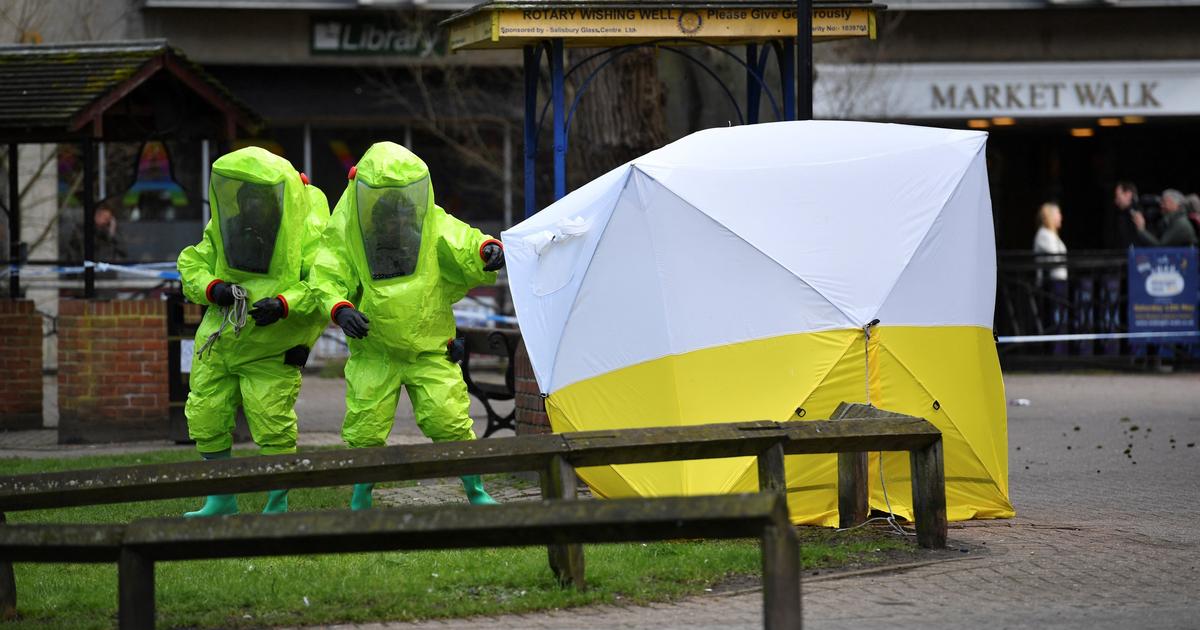Salisbury, Thursday 4th March 2018. The sun is setting over the small town in the south of the UK.
On a bench in the city center, a 66-year-old man and a 33-year-old woman are seated, as if petrified.
But they don't sleep.
Passers-by stop, suddenly noticing that this father and his daughter are unconscious.
He is suddenly seized with convulsions, then freezes, as if dead.
She, fainted, has foam at the mouth.
Sergei Skripal and his daughter Ioulia have just been poisoned by an extremely powerful toxic substance.
This is the beginning of a diplomatic crisis between the West and Russia, the most serious since the end of the cold war.
And four years before the final break caused by the Russian invasion of Ukraine.
A former Russian spy, Sergei Skripal had been living in Salisbury for over 8 years.
Did he live in fear?
Double agent for MI6 in the 1990s after serving in Soviet military intelligence (GRU), the Russian from Kaliningrad was unmasked in the 2000s and sentenced to 16 years in prison for high treason before being exfiltrated to the UK on a prisoner exchange.
Read alsoDGSE: how France recruits its spies
Does he remember, this Thursday, March 4, 2018, the words of President Vladimir Putin in 2010, who swore to make the traitors to Russia pay sooner or later?
At the end of the afternoon, and in front of this dying bench, passers-by call the emergency services.
Urgently evacuated to the hospital, the former double agent and his daughter narrowly escape death.
They leave the hospital after several weeks of care, to be placed in an undisclosed location.
They will live, but in the greatest discretion now.
On March 12, ending much speculation in the British media, Prime Minister Theresa May announced that the two victims had been poisoned with a nerve agent Novichok and declared that it was "very likely" that Russia was responsible for
an
attempt murder of his ex-agent.
This poison, very toxic, penetrates through the skin and attacks a key enzyme of the nervous system.
The muscles are then seized with spasms, causing suffocation and then death.
The substance was developed by the Soviet Union at the end of the last century.
Petrov and Bushirov
Russia then firmly denies any involvement.
But the more the months pass, the more the thesis of a GRU operation becomes credible, in particular thanks to the information provided by several investigative media such as the now famous investigation site Bellingcat, and confirmed by the British authorities.
London initially accuses two Russians of working for the GRU and of having stayed in Salisbury on the very day of the poisoning.
Petrov and Bochirov.
The two alleged agents would have spread the poison, hidden in a perfume bottle, on a door handle.
Video surveillance screenshots are broadcast in the media.
The two Russian nationals, presumed spies, are wanted.
Bochirov and Petrov.
HO / METROPOLITAN POLICE SERVICE / AFP
The two Russian nationals in Salisbury.
HO/Metropolitan Police Service/AFP
Four months later, in the summer of 2018, a British couple suffered Novichok poisoning after handling…a perfume bottle.
The man, Charlie Rowley, had picked it up in Elizabeth Park, Salisbury, having found it by chance, and then gave it to his wife.
After spraying her wrists with the pseudo-perfume, the woman suffers from headaches before collapsing.
Dawn Sturgess, 44, dies within hours.
The man, Charlie Rowley, who washed his hands after realizing the oily substance did not smell like perfume, survives.
The media investigate for several months.
Who are Alexander Petrov and Ruslan Bochirov really?
These aliases hide the real identities of GRU agents: Colonel Anatoli Tchepiga, and doctor Alexander Mishkin.
Both come from remote regions of Russia, and are formally identified by journalists who have come to survey the inhabitants of the villages of Nikolaevka, near the Chinese border, and Loyga, in the north of the country.
Russia, however, continues to strongly deny.
In September 2018, in an improbable interview on Russian television, Petrov and Bochirov maintained their false identity and claimed to have traveled to Salisbury to visit the cathedral and its famous spire, referring to "a tourist
visit
".
British Crown Prosecution Service (CPS) prosecutors eventually charge the two Russian nationals with attempted murder.
A third GRU officer
Today, British investigators are working on the remaining gray areas.
Who exactly participated in the assassination attempt?
How did the GRU commando precisely work out the poisoning process?
The British authorities are issuing an arrest warrant in September 2021 for Sergei Fedotov, a third suspect who arrived in the United Kingdom two days before the poisoning.
The Bellingcat investigative site had also identified him as a senior GRU officer, a graduate of the Russian Military Diplomatic Academy.
In November 2021, London opens a public inquiry into the death of Dawn Sturgess.
Yulia Skripal in May 2018. DYLAN MARTINEZ / POOL / AFP
“
In the longer term, I hope to return to my home, to my country
”, confided Yulia Skripal three months after her poisoning, in a single media appearance.
The 33-year-old said she was "
turned upside down
" and had "
very lucky to survive
".
Today, the Skripals still live in secret.
Read alsoGRU, FSB and SVR: Russian intelligence flaws in Ukraine
Even today, Russia disputes his involvement.
But public figures sometimes indulge in dubious insinuations.
Last August, after the assassination in Moscow of Daria Douguine, daughter of the ideologue close to Putin Alexandre Douguine, the boss of the media RT Russia Margarita Simonyan published an evocative message on Twitter.
"
I think that we will find a few professionals here who want to admire the spiers of the cathedrals around Tallinn
," she wrote, calling thus without hiding for revenge against the woman found guilty of the attack by Moscow, who would take refuge in Estonia.

